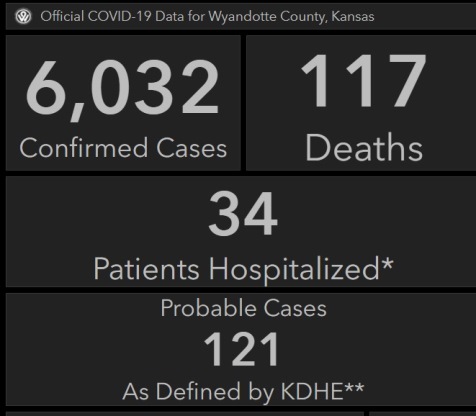
The Unified Government Commission on Thursday night extended the state of the local health emergency until Dec. 14.
There was little discussion at the meeting about extending the state of emergency.
UG Attorney Ken Moore explained that the state of emergency was originally issued in March, and was then extended from July to September. It expires Sept. 15, and the next meeting is Sept. 17. It was added to the Sept. 3 agenda at the last minute, as they did not want to lose funding, according to Moore.
The commission met in person at the fifth floor of City Hall, socially distancing and wearing masks, for less than 10 minutes at the 7 p.m. meeting. Some persons were participating by Zoom or phone. The commission also met in a closed executive session on labor and litigation at 5 p.m.
The commission approved all the items previously on the agenda with one vote. Some grant approvals included state health funding for staffing and infrastructure support and funding for expanded testing for COVID-19. Also approved was an application for a federal grant for police funding, including a comfort canine program and officer protective equipment.
COVID-19 cases increase by 95 in Wyandotte County
Wyandotte County on Thursday reported 6,032 cases of COVID-19, an increase of 95 cases since Wednesday, according to the UG COVID-19 website. There were 117 cumulative deaths reported, an increase of two deaths since Wednesday.
At the University of Kansas Health System in Kansas City, Kansas, Dr. Dana Hawkinson, medical director of infection prevention and control, said there were 23 acute COVID-19 patients hospitalized on Thursday, the same number as Wednesday. There were six patients in the intensive care, down from seven on Wednesday, with three on ventilators, down from four on Wednesday. Five other patients were also on ventilators, but were no longer in the acute infection phase.
New app can screen students, trace cases
At the KU Health System doctors’ news conference on Thursday, Brian McClendon explained how the CVKey app was designed for KU students.
Students and others on the KU campus answer a series of questions each day on the app on their phones, and then the app generates a QR code that will allow the person to enter a building on campus.
According to McClendon, a former Google vice president who also has served as a research professor in electrical engineering and computer science at KU, the app will tell people what to do if they have symptoms. That information can be entered into it by staff at the local student health center.
Technology now exists so people could be notified if they have been close to a person who is positive, according to McClendon.
McClendon also talked about the possibility of still needing to socially distance and wear masks, even after a vaccine comes out. There was discussion of a vaccine coming out in October. If the new vaccine is 50 or 70 percent effective, it doesn’t allow people to change their behavior, McClendon said. It reduces the chance of catching COVID-19, but does not negate it, he said.
Free testing offered
Free testing is offered for those who live and work in Wyandotte County from 9 a.m. to 3 p.m. Monday through Friday at the Unified Government Health Department parking lot at 6th and Ann, Kansas City, Kansas. For more information, call 311.
For more information on who may be tested and what to bring, visit https://wyandotte-county-covid-19-hub-unifiedgov.hub.arcgis.com/pages/what-to-do-if-you-think-you-have-covid-19.
Local health officials announced that anyone with symptoms and those who have been exposed to infected persons should get tested.
“Science demonstrates that people infected with COVID-19 can spread the virus to family, friends and members of their community, even if they show no symptoms,” said Juliann Van Liew, director of the Unified Government Health Department. “In order to control the pandemic, it’s incredibly important that we provide testing for everyone who has been exposed and those considered at risk,” Van Liew said in a news release.
Local health departments determined that testing criteria for COVID-19 across the metro will remain the same, despite recent changes to national testing guidance. Last week, the Centers for Disease Control and Prevention (CDC) modified its coronavirus testing guidelines to exclude people who are asymptomatic.
The incubation period for the virus that causes COVID-19 is between 2-14 days. If you get tested too early after exposure, it’s possible you could get a false-negative test. Based on the latest data, local public health experts advise people who have been exposed to COVID-19 to:
• Check with your local health department for their recommendations on when to get tested.
• Self-quarantine for 14 days after exposure, even if you test negative, as it can take that long for symptoms to appear.
To help reduce the spread, health experts also encourage everyone to protect others by practicing social distancing, washing hands often, staying at home if you are sick, wearing a cloth face mask and frequently cleaning high-touch surfaces.
To see the KU doctors’ news conference, visit https://www.facebook.com/kuhospital/videos/229606908493837.
The UG COVID-19 webpage is at https://alpha.wycokck.org/Coronavirus-COVID-19-Information.
The KC Region COVID-19 Hub dashboard is at http://marc-gis.maps.arcgis.com/apps/opsdashboard/index.html#/1c93961075454558b3bf0dfad014feae.
The Unified Government Health Department is collecting input on people’s experiences getting tested for COVID-19 in Wyandotte County. The survey is on the UG website at https://us.openforms.com/Form/ea97a450-3d74-4d86-8d1f-6e340d55cf7c.
The UG Health Department sports order is online at https://alpha.wycokck.org/files/assets/public/health/documents/covid/08132020localhealthofficerorderregardingsports.pdf.
The Wyandotte County school start order is online at https://alpha.wycokck.org/Coronavirus-COVID-19-Information.
Wyandotte County is under a mandatory mask order and is in Phase 3 of the state’s reopening plan. For more information, residents may visit the UG COVID-19 website at https://alpha.wycokck.org/Coronavirus-COVID-19-Information or call 311 for more information.
The CDC’s COVID-19 web page is at https://www.cdc.gov/coronavirus/2019-nCoV/index.html.
